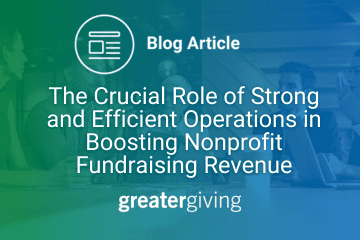
In the nonprofit sector, the focus often falls on fundraising efforts and donor engagement as the primary drivers of success. While these elements are undeniably critical, the backbone of any successful nonprofit organization is its operational efficiency. Strong and efficient operations not only ensure the smooth running of day- to-day activities but also significantly enhance fundraising capabilities and revenue generation. Here’s why nonprofit management must prioritize operational excellence to maximize their fundraising potential.
The Symbiotic Relationship Between Operations and Fundraising
1. Operational Efficiency Builds Donor Confidence
Donors, whether individuals, corporations, or foundations, want to know that their contributions are being used effectively and efficiently. Transparent, well-managed operations demonstrate to donors that the organization is capable of managing funds responsibly. This builds trust and confidence, encouraging both initial donations and repeat contributions.
2. Resource Optimization
Efficient operations ensure that a larger portion of donations can be directed toward the nonprofit’s mission rather than being consumed by administrative overheads. This optimization of resources means that every dollar raised can have a more significant impact, which is a compelling message for potential donors and grant-makers.
3. Improved Program Delivery
Strong operations underpin effective program delivery. When programs are delivered efficiently and effectively, they yield better outcomes and greater impact. Success stories and measurable impact are powerful tools in fundraising, providing tangible evidence of the organization’s effectiveness and worthiness of support.
Key Areas of Operational Focus
Financial Management
Robust financial management practices are fundamental. This includes accurate budgeting, meticulous financial reporting, and regular audits. Clear, transparent financial practices not only comply with regulatory requirements but also assure donors that the organization is financially sound.
Human Resources
Investing in the right people and ensuring they are well-managed and motivated is crucial. Efficient human resource management includes hiring the right talent, providing adequate training, and maintaining high employee morale. Happy, well- supported staff are more productive and effective in both program delivery and fundraising efforts.
Technology and Data Management
Leveraging technology can streamline operations, reduce costs, and enhance fundraising efforts. Effective use of donor management systems, data analytics, and digital communication tools can personalize donor engagement, track fundraising progress, and optimize campaigns. Data-driven decision-making allows nonprofits to target their efforts more effectively and measure their success accurately.
Strategic Planning
A clear strategic plan aligns the organization’s mission with its operational capabilities and fundraising efforts. It ensures that all activities are goal-oriented and resources are allocated efficiently. Regularly revisiting and updating the strategic plan keeps the organization responsive to changing circumstances and opportunities.
Process Optimization
The documentation of and the continuous improvement of internal processes is essential. Streamlining workflows, reducing redundancies, and implementing best practices enhance overall efficiency. This not only reduces costs but also ensures that staff can focus more on mission-critical activities, including fundraising.
Benefits of Focusing on Operational Efficiency
Enhanced Fundraising Campaigns
With strong operations, nonprofits can execute fundraising campaigns more effectively. From planning and execution to follow-up and reporting, every phase of the campaign benefits from streamlined processes and clear communication.
Increased Donor Retention and Loyalty
Efficient operations lead to better donor experiences. Prompt acknowledgments, transparent communication, and efficient handling of donations foster a positive relationship with donors. Satisfied donors are more likely to continue their support and advocate for the organization.
Capacity for Innovation
When operational processes are optimized, nonprofits can allocate more resources toward innovative initiatives. Whether it’s exploring new fundraising avenues, developing new programs, or expanding outreach efforts, efficient operations provide the capacity to innovate and grow.
Crisis Resilience
Strong operations provide a solid foundation that enhances an organization’s resilience to crises. Whether facing economic downturns, funding cuts, or unexpected challenges, nonprofits with robust operations can adapt and continue their mission with minimal disruption.
Strong and Efficient Operations Create Strong Nonprofit Fundraising Revenue
For nonprofit organizations, focusing on strong and efficient operations is not merely a matter of internal housekeeping; it’s a strategic imperative that directly influences fundraising success. By building trust, optimizing resources, and enhancing program delivery, efficient operations create a virtuous cycle of increased donor confidence and revenue growth. Nonprofit management must prioritize operational excellence to not only survive but thrive in an increasingly competitive and demanding landscape. In doing so, they ensure that every dollar raised goes further, making a more significant impact on the communities they serve.
